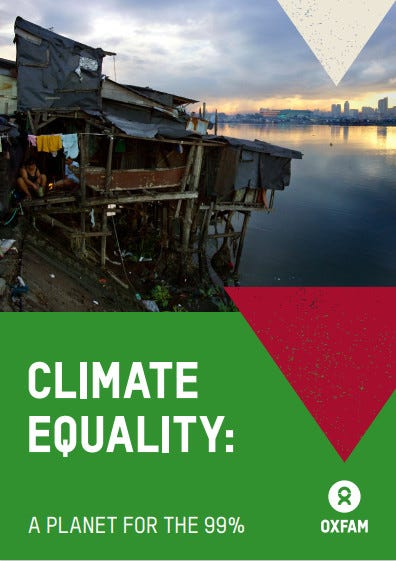Climate inequality hub
“The rich cause the problem, the poor pay the highest price. Oxfam finds the richest billionaires emit more carbon in an hour and a half than the average person does in a lifetime.” António Guterres, UN Secretary-General's remarks to World Leaders Climate Action Summit at COP29
Here’s every global climate and inequality report Oxfam has released ahead of the Conference of the Parties (COP).
2025 - Climate Plunder: How a powerful few are locking the world into disaster
Oxfam research finds that the high-carbon lifestyles of the super-rich are blowing through the world’s remaining carbon budget - the amount of CO2 that can be emitted while avoiding climate disaster. The research also details how billionaires are using their political and economic influence to keep humanity hooked on fossil fuels to maximize their private profit.
2024 - Carbon Inequality Kills: Why curbing the excessive emissions of an elite few can create a sustainable planet for all
The only way to beat climate breakdown and deliver social justice is to radically reduce inequality. This briefing paper investigates the catastrophic climate impacts of the super yachts, private jets and investments of the world’s richest individuals. The emissions of the world’s super-rich are causing economic losses of trillions of dollars; contributing to huge crop losses; and leading to millions of excess deaths.
As global temperatures continue to rise, we must act now to curb the emissions of the super-rich and make rich polluters pay.
2023 - Climate Equality: A planet for the 99%
“The most comprehensive study of global climate inequality ever undertaken.” Jonathan Watts Global environment editor, The Guardian.
In this flagship report, Oxfam sets out how the richest people, corporations and countries are destroying the world with their huge carbon emissions. Meanwhile, people living in poverty, those experiencing marginalization, and countries in the Global South are those impacted the hardest.
Only a radical reduction in inequality, transformative climate action and fundamentally shifting our economic goals as a society can save our planet while ensuring wellbeing for all.
2022 - Carbon Billionaires: The investment emissions of the world’s richest people
The world’s richest people emit huge and unsustainable amounts of carbon and, unlike ordinary people, 50% to 70% of their emissions result from their investments. New analysis of the investments of 125 of the world’s richest billionaires shows that on average, they are emitting 3 million tonnes a year, more than a million times the average for someone in the bottom 90% of humanity.
Billionaires hold extensive stakes in many of the world’s largest and most powerful corporations, which gives them the power to influence the way these companies act. Governments must hold corporations to account and impose new taxes on wealth and investments in polluting industries.
2021 - Carbon inequality in 2030
The world’s richest 1% are set to have per capita consumption emissions in 2030 that are still 30 times higher than the global per capita level compatible with the 1.5⁰C goal of the Paris Agreement, while the footprints of the poorest half of the world population are set to remain several times below that level. By 2030, the richest 1% are on course for an even greater share of total global emissions than when the Paris Agreement was signed.
Tackling extreme inequality and targeting the excessive emissions linked to the consumption and investments of the world’s richest people is vital to keeping the 1.5⁰C Paris goal alive.
2020 - Confronting carbon inequality: Putting climate justice at the heart of the COVID-19 recovery
Despite sharp falls in carbon emissions in 2020 linked to the COVID-19 pandemic, the climate crisis – which is driven by the accumulation of emissions in the atmosphere over time – continued to grow.
This briefing describes new research that shows how extreme carbon inequality in recent decades has brought the world to the climate brink. It sets out how governments must use this historic juncture to build fairer economies within the limits our planet can bear.





